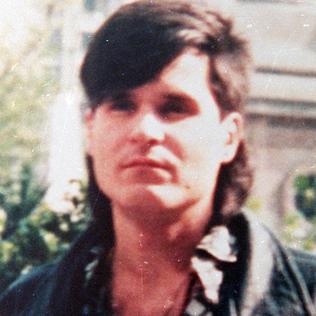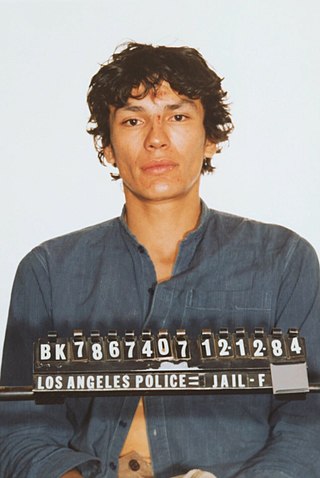Related Research Articles
Cara Sucia is a Venezuelan telenovela written by Carlos Romero and Alberto Gómez and produced by Venevisión in 1992. The telenovela was distributed internationally by Venevisión International and was dubbed into English, Russian, Mongolian, Indonesian, and (Filipino) in the Philippines. Guillermo Dávila and Sonya Smith starred as the main protagonists with Gigi Zanchetta and Humberto García as the main antagonists.

The Caravan of Death was a Chilean Army death squad that, following the Chilean coup of 1973, flew by helicopters from south to north of Chile between September 30 and October 22, 1973. During this foray, members of the squad ordered or personally carried out the execution of at least 75 individuals held in Army custody in certain garrisons. According to the NGO Memoria y Justicia, the squad killed 97 people: 26 in the South and 71 in the North.

Adolfo de Jesús Constanzo was a Cuban-American serial killer, drug dealer and cult leader who led an infamous drug-trafficking and occult gang in Matamoros, Tamaulipas, Mexico, that was dubbed the Narcosatanists by the media. His cult members nicknamed him The Godfather. Constanzo led the cult with Sara Aldrete, whom followers nicknamed "The Godmother". The cult was involved in multiple ritualistic killings in Matamoros, including the murder of Mark Kilroy, an American student abducted, tortured and killed in the area in 1989.

Sara María Aldrete Villareal is a Mexican serial killer who was convicted of murder while heading a drug-smuggling and human sacrifice cult with Adolfo Constanzo. The members of the cult, dubbed by the media as The Narcosatanists, called her The Godmother, with Constanzo as "The Godfather". The cult was involved in multiple ritualistic killings in Matamoros, Tamaulipas, including the murder of Mark Kilroy, an American student killed in Matamoros in 1989. She received a sentence of 62 years.

Carlos Eduardo Robledo Puch, also known as The Angel of Death and The Black Angel, is an Argentine serial killer. He was convicted of at least eleven murders, one attempted murder, seventeen robberies, involvement in one rape and one attempted rape, one count of sexual abuse, two kidnappings, and two thefts. Most of the offenses occurred in the northern area of Greater Buenos Aires.
Instinto Asesino is a series produced by Endemol Argentina for the Discovery Channel. Each episode portrays a notorious Criminal case that occurred in a country in Latin America. So far, cases depicted occurred in Argentina, Brazil, Chile, Colombia, Mexico and Venezuela.

Ricardo Leyva Muñoz Ramirez, better known as Richard Ramirez, was an American serial killer and sex offender whose killing spree occurred in Greater Los Angeles and the San Francisco Bay Area in the state of California. From April 1984 to August 1985, Ramirez murdered at least fourteen people during various break-ins, with his crimes usually taking place in the afternoon, leading to him being dubbed the Night Stalker, the Walk-In Killer, and the Valley Intruder. He was convicted and sentenced to death in 1989 and died while awaiting execution in 2013.
Pedro Pablo Nakada Ludeña a.k.a. "El Apóstol de la Muerte" is a Peruvian serial killer who claimed 25 victims and was convicted of 17 murders. He was sentenced to 35 years in prison.
Silvia Meraz Moreno is a Mexican serial killer and sect leader who was convicted of three murders which took place between 2009 and 2012 in Nacozari, Sonora. Three people were murdered as human sacrifices to Santa Muerte.
Alejandro Máynez is a Mexican alleged serial killer and fugitive. Along with Ana Benavides and Melchor Máynez, he killed at least two women in Ciudad Juárez, but he is believed to be responsible for 50 victims in all. His murders are organized and motivated by sexual compulsion, committed as part of a group.

Horacio Rodríguez Larreta is an Argentine economist, politician and the former Chief of Government of the City of Buenos Aires. Larreta was re-elected in 2019 with almost 56% of the votes, becoming the first candidate to win a mayoral election in the first round since the adoption of Buenos Aires's autonomous constitution. He won in every comuna, except Comuna 4 and Comuna 8.
Saldaño, el sueño dorado is a 2014 documentary by Raúl Viarruel about Víctor Saldaño, an Argentine man on death row in Texas.

Camilo Marcelo Catrillanca Marín was a Mapuche farmer from Temucuicui in Chile who was shot to death by the Chilean police force under suspicious circumstances. The incident led to protests against police violence, and occurred in the broader context of the ongoing conflict over Mapuche civil rights.
Agustín Ramón Martínez Martínez, known as Israeli Soldier, was a Paraguayan-Israeli serial killer and fraudster who killed at least six people in Argentina and Paraguay from 1993 to 2018, but was suspected in other murders. For his last murder, he was sentenced to 40 years' imprisonment.
The Madman of the route is the nickname given to an alleged serial killer active in Mar de Plata, Argentina from 1996 to 1999. The allegations claim that a single killer is responsible for the murders and disappearances of at least 14 prostitutes, some of which were later found raped and mutilated near highways, sometimes with words written on their bodies.
Between March and June 2022, unusually high infant mortality rates occurred at a neonatal nursing unit in the Ramón Castillo Neonatal Hospital in Córdoba, Argentina. A series of investigations initially pointed to a hospital-acquired infection or malpractice.
References
- 1 2 3 "El largo prontuario de Marcelo Antelo" [The long record of Marcelo Antelo]. Clarín (in Spanish). September 9, 2012. Archived from the original on September 10, 2019.
- 1 2 3 "La Saga de San la Muerte" [The Saga of Saint Death]. Clarín (in Spanish). August 8, 2012. Archived from the original on September 10, 2019. Retrieved November 24, 2019.
- 1 2 3 "El Cierre de un Caso Espeluznante: Mató a cuatro personas: Perpetua para el asesino que invocaba a San La Muerte" [The Closure of a Horrifying Case: He killed four people: Life for the murderer who invoked San La Muerte]. Clarín (in Spanish). September 8, 2012. Archived from the original on September 10, 2019. Retrieved November 24, 2019.
- 1 2 3 4 "Una Saga de Robos Y Homicidios" [A Saga of Theft and Homicide]. Clarín (in Spanish). September 1, 2012. Archived from the original on September 10, 2019. Retrieved November 24, 2019.
- 1 2 3 4 5 6 "El Cierre de un Caso Espeluznante: Los delitos por los que lo condenaron" [The Closure of a Horrifying Case: The crimes for which he was convicted]. Clarín (in Spanish). September 8, 2012. Archived from the original on September 10, 2019. Retrieved November 24, 2019.
- ↑ "Horacio Ezcurra. Un Padre Enfrentado a un Criminal Serial" [Horacio Ezcurra: A Father Faced A Serial Criminal]. Clarín (in Spanish). September 9, 2012. Archived from the original on September 10, 2019. Retrieved November 24, 2019.